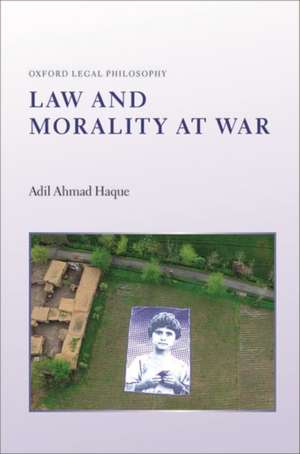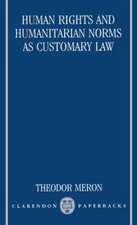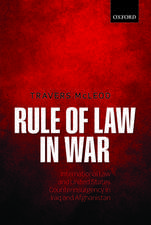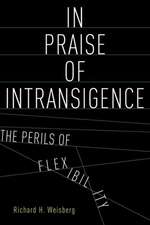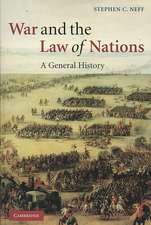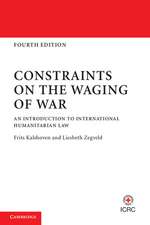Law and Morality at War: Oxford Legal Philosophy
Autor Adil Ahmad Haqueen Limba Engleză Paperback – 13 feb 2020
| Toate formatele și edițiile | Preț | Express |
|---|---|---|
| Paperback (1) | 297.09 lei 10-16 zile | |
| OUP OXFORD – 13 feb 2020 | 297.09 lei 10-16 zile | |
| Hardback (1) | 582.40 lei 31-37 zile | |
| OUP OXFORD – 26 ian 2017 | 582.40 lei 31-37 zile |
Preț: 297.09 lei
Preț vechi: 342.41 lei
-13% Nou
Puncte Express: 446
Preț estimativ în valută:
56.85€ • 59.35$ • 47.05£
56.85€ • 59.35$ • 47.05£
Carte disponibilă
Livrare economică 04-10 martie
Preluare comenzi: 021 569.72.76
Specificații
ISBN-13: 9780198859321
ISBN-10: 0198859325
Pagini: 304
Dimensiuni: 157 x 235 x 18 mm
Greutate: 0.47 kg
Editura: OUP OXFORD
Colecția OUP Oxford
Seria Oxford Legal Philosophy
Locul publicării:Oxford, United Kingdom
ISBN-10: 0198859325
Pagini: 304
Dimensiuni: 157 x 235 x 18 mm
Greutate: 0.47 kg
Editura: OUP OXFORD
Colecția OUP Oxford
Seria Oxford Legal Philosophy
Locul publicării:Oxford, United Kingdom
Recenzii
Anyone interested in better understanding the complex interplay of law and morality, both of which are interlinked with politics, should set aside some quality time to pour over this thought-provoking book.
Adil Ahmad Haque's Law and Morality at War is ... a crucial advance in both fields, drawing on Haque's expertise in both the ethics of war and international law to illuminate the relationship between law and morality.
Adil Ahmad Haque's Law and Morality at War is a significant moment in the contemporary debate on just-war theory on the morality of law. It offers an elegant "third way" between the traditional account of IHL as reflective of morality and the revisionist account of IHL as directly contradicting fundamental moral concepts - a system that is only defensible, at best, as a pragmatic concession. In doing so, Haque displays a rare command - even among international lawyers writing in the just-war tradition of philosophical literature, analytic method and legal reasoning.
Few scholars have contributed as much to recent debates about the ethics of war as Haque, and Law and Morality at War continues in this fine tradition, touching on everything from the principle of proportionality to the targeting of human shields. Straddling the moral and legal divide, Haque succeeds in correcting the misperceptions that many moral philosophers have about the law, including the presumption that it permits combatants to fight for an unjust cause when it really only immunises them against prosecution. Haque also sets out a number of ways that the law could be improved and his suggestions are often pretty radical.
Adil Ahmad Haque's book ... showcases interdisciplinary scholarship at its best.
Law and Morality at War is a must read for anyone working on war with an interest in theory. ... Haque's sharp, careful writing is a pleasure to read. He does a great job in guiding readers through thorny questions, with clarity, subtlety, and rigor, keeping it interesting and, at times, being intellectually quite fun. I have also found the book to be a fantastic teaching resource, confronting students with important challenges, clear analysis, and provocative arguments.
This superb book asks how morality and law can get a purchase on the violence of war. Law and Morality at War combines philosophical sophistication with a deep knowledge of the law, and that makes it uniquely valuable. In the past decade, philosophers have subjected the so-called "just war theory" to searching examination, with results that are sometimes startling. At the same time, seemingly endless wars in the Middle East have forced lawyers to confront new and intricate legal questions. All too often the two tracks of philosophy and law ignore each other. Haque is one of the few scholars with the skill, breadth of knowledge, and human wisdom to bring them together. The book is a major contribution that ought to attract readers both in and outside the academy.
This book is the single best work to date on the relation between the morality of war and the law of war. Over the past two decades many of the elements of the traditional theory of the just war have been effectively subverted by philosophical criticism. Because this theory has been assumed to provide a moral foundation for the contemporary law of war, international lawyers have been under pressure either to rebut the objections, supply new moral foundations for existing law, or reinterpret or revise the law to render it compatible with our best understanding of the morality of war. Haque's exceptionally brilliant book combines and defends responses of all three types in seeking to bring law and morality into closer congruence. It is a masterpiece of both legal theory and moral philosophy.
The legal regulation of warfare involves an ever-present tension between idealism and realism, between imagining a more perfect arrangement for human affairs and making peace with the reality that war is, in some cases, inevitable. In this stimulating and provocative book, Haque deftly combines close legal analysis about the current state of international law with philosophical insights on how it should evolve. Few scholars have such an impressive command of both domains and the insight and daring to combine them so effectively.
Adil Ahmad Haque's Law and Morality at War is ... a crucial advance in both fields, drawing on Haque's expertise in both the ethics of war and international law to illuminate the relationship between law and morality.
Adil Ahmad Haque's Law and Morality at War is a significant moment in the contemporary debate on just-war theory on the morality of law. It offers an elegant "third way" between the traditional account of IHL as reflective of morality and the revisionist account of IHL as directly contradicting fundamental moral concepts - a system that is only defensible, at best, as a pragmatic concession. In doing so, Haque displays a rare command - even among international lawyers writing in the just-war tradition of philosophical literature, analytic method and legal reasoning.
Few scholars have contributed as much to recent debates about the ethics of war as Haque, and Law and Morality at War continues in this fine tradition, touching on everything from the principle of proportionality to the targeting of human shields. Straddling the moral and legal divide, Haque succeeds in correcting the misperceptions that many moral philosophers have about the law, including the presumption that it permits combatants to fight for an unjust cause when it really only immunises them against prosecution. Haque also sets out a number of ways that the law could be improved and his suggestions are often pretty radical.
Adil Ahmad Haque's book ... showcases interdisciplinary scholarship at its best.
Law and Morality at War is a must read for anyone working on war with an interest in theory. ... Haque's sharp, careful writing is a pleasure to read. He does a great job in guiding readers through thorny questions, with clarity, subtlety, and rigor, keeping it interesting and, at times, being intellectually quite fun. I have also found the book to be a fantastic teaching resource, confronting students with important challenges, clear analysis, and provocative arguments.
This superb book asks how morality and law can get a purchase on the violence of war. Law and Morality at War combines philosophical sophistication with a deep knowledge of the law, and that makes it uniquely valuable. In the past decade, philosophers have subjected the so-called "just war theory" to searching examination, with results that are sometimes startling. At the same time, seemingly endless wars in the Middle East have forced lawyers to confront new and intricate legal questions. All too often the two tracks of philosophy and law ignore each other. Haque is one of the few scholars with the skill, breadth of knowledge, and human wisdom to bring them together. The book is a major contribution that ought to attract readers both in and outside the academy.
This book is the single best work to date on the relation between the morality of war and the law of war. Over the past two decades many of the elements of the traditional theory of the just war have been effectively subverted by philosophical criticism. Because this theory has been assumed to provide a moral foundation for the contemporary law of war, international lawyers have been under pressure either to rebut the objections, supply new moral foundations for existing law, or reinterpret or revise the law to render it compatible with our best understanding of the morality of war. Haque's exceptionally brilliant book combines and defends responses of all three types in seeking to bring law and morality into closer congruence. It is a masterpiece of both legal theory and moral philosophy.
The legal regulation of warfare involves an ever-present tension between idealism and realism, between imagining a more perfect arrangement for human affairs and making peace with the reality that war is, in some cases, inevitable. In this stimulating and provocative book, Haque deftly combines close legal analysis about the current state of international law with philosophical insights on how it should evolve. Few scholars have such an impressive command of both domains and the insight and daring to combine them so effectively.
Notă biografică
Adil Ahmad Haque is Professor of Law and Judge Jon O. Newman Scholar at Rutgers Law School as well as Associate Graduate Faculty at the Rutgers University Department of Philosophy.
